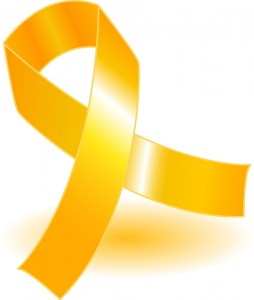Last updated on August 16th, 2018 at 10:11 am
Do you know what sarcoma is?
If not, you are one of 53% of people who have not heard of it (according to a poll carried out by Sarcoma UK in 2015).
 What is sarcoma?
What is sarcoma?
Sarcomas are cancers that can develop in any part of the body. They are rare and mainly affect:
- muscle
- bone
- nerves
- cartilage
- tendons
- blood vessels
- fatty and fibrous tissues
The tumours can also develop in the female reproductive system (gynaecological sarcoma) and the stomach and intestines (retroperitoneal sarcomas).
Who does sarcoma affect?
- Around 3,830 people are diagnosed with sarcoma each year – 3,300 with soft tissue sarcomas and 500 with bone sarcoma.
- Bone and soft tissue sarcoma sufferers tend to be younger than most cancer patients with 16% of those diagnosed being under 30 years of age.
- 15% of childhood cancers (0-14) and 11% of teenage cancers (15 -24) diagnosed are sarcomas.
Types of sarcoma cancer
Bone sarcoma
This is a very rare cancer that starts in the bone. It usually affects the legs but can affect any bone in the body.
Symptoms of bone sarcoma
Symptoms can differ depending on where the tumour is located and how big it is, but commonly include:
- pain in the bone – especially at night time
- swellings
- restricted movement of joints
As can be imagined, these symptoms don’t always indicate that bone sarcoma is present and are very similar to the sort of symptoms you might experience from injuries, such as sports injuries. If you are worried about your symptoms, or those of a child, which can be confused with growing pains, you should contact your doctor.
How is bone sarcoma diagnosed?
The cancer is usually diagnosed with scans, such as:
- x-rays
- CT scan
- PET (position emission tomography) – shows changes in tissues
- MRI scan
- bone scan – using radioactive chemicals that are injected, swallowed or breathed into the body
- histopathology – examination of tissue
- blood test
Treatment of bone sarcoma
Sarcoma treatment centres are located in Newcastle, Manchester & Oswestry, Birmingham, Oxford and London. The National Institute for Health and Care Excellence (NICE) recommends that anyone diagnosed with sarcoma should be referred to a specialist team at one of these centres.
Treatment will depend upon the type and grade of bone sarcoma and what part of the body it has affected. You can find out more about bone sarcoma grading and treatments on Sarcoma UK’s website.
Soft tissue sarcomas
These cancers generally develop in the muscles, nerves, tendons, blood vessels and fatty and fibrous tissues of the arms legs and trunk of the body, as well as the stomach, intestines and female reproductive system. There are several types of soft tissue sarcoma and you can read about them on Sarcoma UK’s website.
Symptoms of soft tissue sarcomas
Those suffering from soft tissue sarcomas may find a lump under the skin – usually on the arm, leg or trunk of the body, that is:
- larger than 5cm
- increasing in size
- usually painful (although not always)
Whether some or all of these symptoms appear depends on the size of the tumour and where it is located.
How are soft tissue sarcomas diagnosed?
Soft tissue sarcomas are often diagnosed when someone visits their doctor when they have found a lump. Once this has been examined and a sarcoma is suspected, further tests can be carried out, including:
- x-ray
- ultrasound
- CT scan
- EUS scan (endoscopic ultrasound scan), where an endoscope (tube) is inserted into the gut to look for tumours
- PET scan
- MRI scan
- histopathology
- blood test
Treatment of soft tissue sarcomas
Soft tissue sarcomas are treated in the same centres as bone sarcoma. Depending on the type and grade of sarcoma, treatment can include:
- surgery – usually the first treatment supported with radiotherapy and chemotherapy
- radiotherapy
- chemotherapy
- clinical trials – new methods of diagnosing and treating the cancer are taking place and a patient may be offered the opportunity to take part in these
Further information about the grading and treatment of soft tissue sarcomas can be found on Sarcoma UK’s website.
How can Graysons help?
If you have suffered a delay in diagnosis, or a misdiagnosis of cancer, that has led to a more traumatic experience or worsening health, then we are here to help you.
We understand that a delay in diagnosing and treating your cancer can result in a metastatic (development of secondary growths) spread of the cancer meaning that you would have to undergo more extensive and aggressive treatment such as surgery, radiotherapy and/or chemotherapy that may otherwise have been avoided, affecting your prognosis.
We understand that more extensive treatment can have a severe strain on the financial, psychological and physical health of the whole family.
Our medical negligence team are recognised experts in conducting claims of this kind and, with the involvement of a team of specialist experts, we will help you to secure a financial settlement that will provide both financial security and a care package ensuring that your life-long care needs will be met.
Where to find further information
You can find out more about failure to diagnose or misdiagnosis of cancer on our web pages.
Sarcoma UK has lots of advice and information on its website and also has a helpline on 0808 8010401 or supportline@sarcomauk.org.uk
